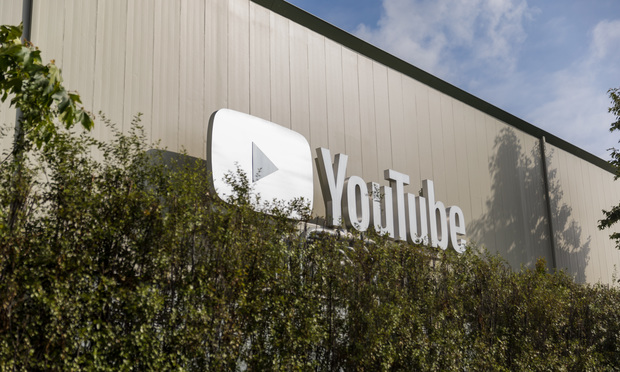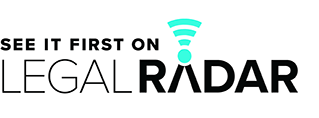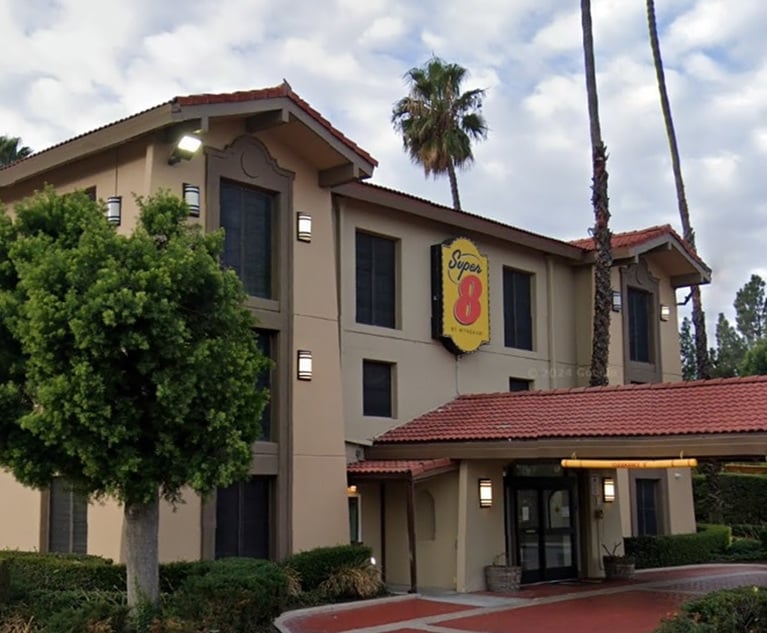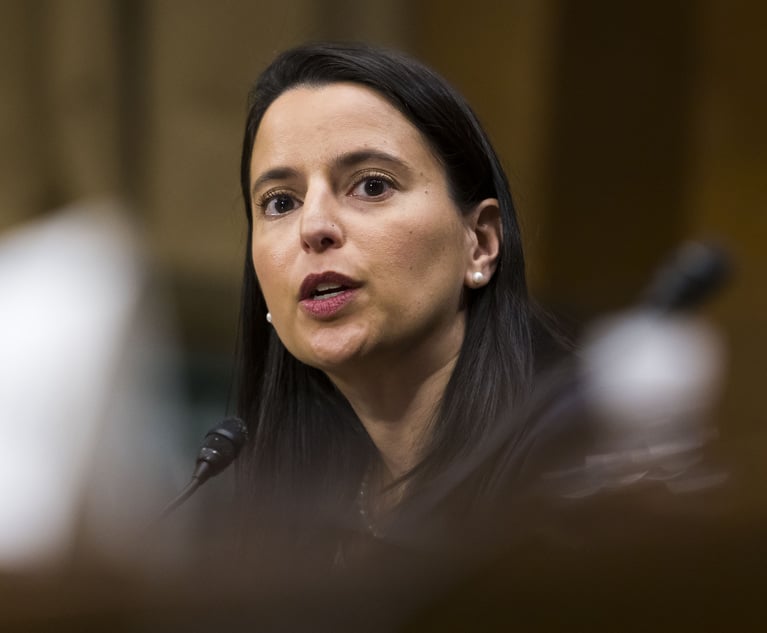YouTube Smacked With Class Action Lawsuit Over Its Copyright Enforcement
The class action complaint asks the Northern District of California to require YouTube to open up its Content ID copyright identification tool to everyone.
July 02, 2020 at 06:09 PM
3 minute read
 YouTube Playa Vista. (Photo: Jason Doiy/ALM)
YouTube Playa Vista. (Photo: Jason Doiy/ALM)
Grammy award-winning artist Maria Schneider is demanding access to YouTube's copyright enforcement tools, which she argues only protect major record labels and studios, in a class action complaint filed Thursday.
Korein Tillery and Boies Schiller Flexner filed the suit in the Northern District of California on behalf of Schneider, a composer, musician and advocate for artist rights, and Pirate Monitor LTD, a company that owns the rights to several Hungarian films.
 The lawsuit contends that YouTube's copyright policies leave artists like Schneider behind by design to boost the platforms' user volume and advertising revenue. YouTube's primary policing tool, Content ID, uses automation to identify copyrighted works. Qualifying copyright holders, who can demonstrate a need and that their content can be claimed through the tool, can protect their intellectual property with Content ID, but it is not available to all artists, the lawsuit claims.
The lawsuit contends that YouTube's copyright policies leave artists like Schneider behind by design to boost the platforms' user volume and advertising revenue. YouTube's primary policing tool, Content ID, uses automation to identify copyrighted works. Qualifying copyright holders, who can demonstrate a need and that their content can be claimed through the tool, can protect their intellectual property with Content ID, but it is not available to all artists, the lawsuit claims.
"Smaller rights holders, including plaintiffs and the class, are, however, denied access to Content ID and thus are relegated to vastly inferior and time-consuming manual means of trying to police and manage their copyrights such as scanning the entirety of YouTube postings, searching for keywords, titles, and other potential identifiers," write a team of attorneys that includes Korein Tillery's George Zelcs and Boies' Philip Korologos.
Zelc and a Boies representative declined a request for comment.
Instead, they assert, proposed class members must file individual takedown notices through YouTube's web-form email. "Defendants have, in effect, created a two-tiered system whereby the rights of large creators with the resources to take defendants to court on their own are protected, while smaller and independent creators like plaintiffs and the class are deliberately left out in the cold," they wrote in the 44-page complaint.
The lawsuit is asking the court to require YouTube to offer Content ID and its other enforcement tools to the public. The proposed class is also asking for disgorgement and damages based on profits from the website's allegedly infringing acts.
Google, YouTube's parent company, declined to comment on pending litigation.
 Sign up for Law.com's Legal Radar to keep up with the latest news and lawsuits in a free, personalized news feed. Track class actions and who's getting the work by industry, practice area, law firm, company and region.
Sign up for Law.com's Legal Radar to keep up with the latest news and lawsuits in a free, personalized news feed. Track class actions and who's getting the work by industry, practice area, law firm, company and region.
This content has been archived. It is available through our partners, LexisNexis® and Bloomberg Law.
To view this content, please continue to their sites.
Not a Lexis Subscriber?
Subscribe Now
Not a Bloomberg Law Subscriber?
Subscribe Now
NOT FOR REPRINT
© 2025 ALM Global, LLC, All Rights Reserved. Request academic re-use from www.copyright.com. All other uses, submit a request to [email protected]. For more information visit Asset & Logo Licensing.
You Might Like
View All
Latham Adds Former Treasury Department Lawyer for Cross-Border Deal Guidance
2 minute read
Law Firms Expand Scope of Immigration Expertise Amid Blitz of Trump Orders
6 minute read
Law Firms Mentioned
Trending Stories
- 1Conversation Catalyst: Transforming Professional Advancement Through Strategic Dialogue
- 2Trump Taps McKinsey CLO Pierre Gentin for Commerce Department GC
- 3Critical Mass With Law.com's Amanda Bronstad: 700+ Residents Near Ohio Derailment File New Suit, Is the FAA to Blame For Last Month's Air Disasters?
- 4Law Journal Column on Marital Residence Sales in Pending Divorces Puts 'Misplaced' Reliance on Two Cases
- 5A Message to the Community: Meeting the Moment in 2025
Who Got The Work
J. Brugh Lower of Gibbons has entered an appearance for industrial equipment supplier Devco Corporation in a pending trademark infringement lawsuit. The suit, accusing the defendant of selling knock-off Graco products, was filed Dec. 18 in New Jersey District Court by Rivkin Radler on behalf of Graco Inc. and Graco Minnesota. The case, assigned to U.S. District Judge Zahid N. Quraishi, is 3:24-cv-11294, Graco Inc. et al v. Devco Corporation.
Who Got The Work
Rebecca Maller-Stein and Kent A. Yalowitz of Arnold & Porter Kaye Scholer have entered their appearances for Hanaco Venture Capital and its executives, Lior Prosor and David Frankel, in a pending securities lawsuit. The action, filed on Dec. 24 in New York Southern District Court by Zell, Aron & Co. on behalf of Goldeneye Advisors, accuses the defendants of negligently and fraudulently managing the plaintiff's $1 million investment. The case, assigned to U.S. District Judge Vernon S. Broderick, is 1:24-cv-09918, Goldeneye Advisors, LLC v. Hanaco Venture Capital, Ltd. et al.
Who Got The Work
Attorneys from A&O Shearman has stepped in as defense counsel for Toronto-Dominion Bank and other defendants in a pending securities class action. The suit, filed Dec. 11 in New York Southern District Court by Bleichmar Fonti & Auld, accuses the defendants of concealing the bank's 'pervasive' deficiencies in regards to its compliance with the Bank Secrecy Act and the quality of its anti-money laundering controls. The case, assigned to U.S. District Judge Arun Subramanian, is 1:24-cv-09445, Gonzalez v. The Toronto-Dominion Bank et al.
Who Got The Work
Crown Castle International, a Pennsylvania company providing shared communications infrastructure, has turned to Luke D. Wolf of Gordon Rees Scully Mansukhani to fend off a pending breach-of-contract lawsuit. The court action, filed Nov. 25 in Michigan Eastern District Court by Hooper Hathaway PC on behalf of The Town Residences LLC, accuses Crown Castle of failing to transfer approximately $30,000 in utility payments from T-Mobile in breach of a roof-top lease and assignment agreement. The case, assigned to U.S. District Judge Susan K. Declercq, is 2:24-cv-13131, The Town Residences LLC v. T-Mobile US, Inc. et al.
Who Got The Work
Wilfred P. Coronato and Daniel M. Schwartz of McCarter & English have stepped in as defense counsel to Electrolux Home Products Inc. in a pending product liability lawsuit. The court action, filed Nov. 26 in New York Eastern District Court by Poulos Lopiccolo PC and Nagel Rice LLP on behalf of David Stern, alleges that the defendant's refrigerators’ drawers and shelving repeatedly break and fall apart within months after purchase. The case, assigned to U.S. District Judge Joan M. Azrack, is 2:24-cv-08204, Stern v. Electrolux Home Products, Inc.
Featured Firms
Law Offices of Gary Martin Hays & Associates, P.C.
(470) 294-1674
Law Offices of Mark E. Salomone
(857) 444-6468
Smith & Hassler
(713) 739-1250







